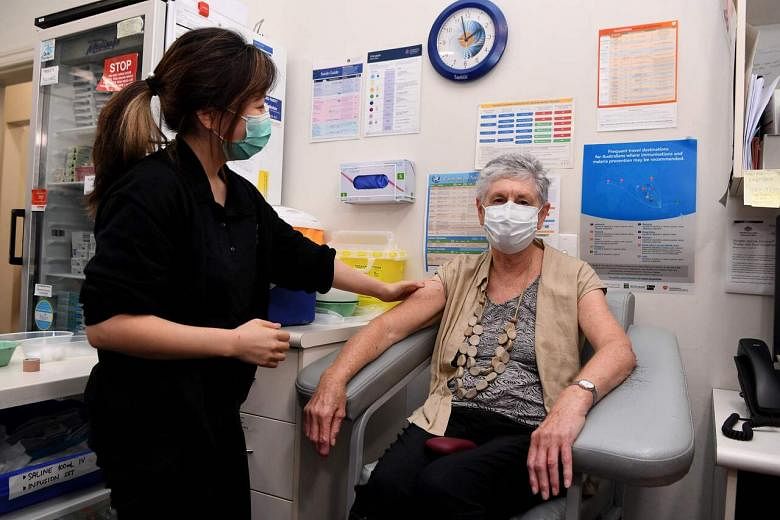SYDNEY - Australian Prime Minister Scott Morrison enthusiastically rolled up his sleeve two months ago and received a jab at a televised event to launch the nation's Covid-19 vaccine roll-out.
Wearing an Australian flag face mask, he declared: "I'm ready to go, just like the country."
But the Prime Minister's air of cheerful confidence has quickly faded as the nation's roll-out has been beset by broken promises, backdowns and missed deadlines.
Despite being one of the world's most successful countries in combating the Covid-19 pandemic, Australia's handling of inoculations has largely been a slow, confusing mess that has been marred by a series of mistakes and accidents.
The federal government initially predicted that four million vaccine doses would be administered by early March and that all Australians would be vaccinated by October. As at Thursday (April 15), Australia had vaccinated 1,359,305 people, or less than 5 per cent of its population of 25 million.
Last Sunday, Mr Morrison revealed he was formally abandoning the October target and was unwilling to set a new date for covering the entire population.
"While we would like to see these doses completed before the end of the year, it is not possible to set such targets given the many uncertainties involved," he said in a statement on Facebook.
The decision to drop roll-out targets followed the government's heavy reliance on the AstraZeneca vaccine, which is being manufactured locally. Australia has secured 170 million doses of vaccines, including 54 million AstraZeneca ones, 40 million Pfizer and 51 million Novavax.
But the reliance on AstraZeneca backfired after the government was forced to announce last week that it was not recommended for people aged under 50. The decision was prompted by some instances of blood clotting around the world.
But the roll-out has also been hampered by problems in distributing the vaccines. General practitioners say they have been given little or no information about when they will receive supplies or the numbers of doses. This has made it hard to arrange appointments with recipients.
State governments, which oversee hospitals, have also criticised the federal government for failing to provide adequate information about supplies.
Mr Morrison had initially resisted calls to create mass vaccination centres but he switched tack this week, saying that such facilities would now be needed to ensure that doses could be quickly administered in the final three months of the year.
He said the AstraZeneca problems had required a "major reassessment" of the roll-out.
"It's not the first time we've had to deal with problems with Covid and we've worked together to resolve them," he told 2GB Radio on Thursday. "I would hope we can achieve that (vaccinating all Australians by the end of 2021), but I can't guarantee that."
Australia was deliberately slow to start its vaccination programme, partly because it is largely free of community-transmitted cases. But the lack of urgency appears to have led to bungles and oversights, raising concerns that public confidence in vaccines will be affected.
Mr Morrison has faced heavy criticism and is in danger of losing public support ahead of the next general election, which is likely to be held early next year. Typically, the Labor opposition is favoured to achieve public health outcomes and may benefit from further delays in the roll-out.
Dr Omar Khorshid, the president of the Australian Medical Association, said on Thursday that mass vaccination centres would not fix Australia's roll-out challenges, noting that the main problem was a lack of supply.
"It doesn't matter whether you've got small centres, big centres, you can only deliver the amount of vaccine you've got," he told ABC News.
Some public health experts have warned that Australia may not be able to vaccinate its entire population until the end of 2022 due to a lack of supplies.
"We need to settle in for the long haul because I don't think we will be getting significant amounts of Pfizer vaccine until next year," Professor John Dwyer, from the University of New South Wales, told The Sydney Morning Herald on Thursday.
Professor Adrian Esterman from the University of South Australia wrote on The Conversation website: "Unfortunately, Australia's slow and problematic vaccine roll-out has somewhat taken the shine off our enviable reputation for managing Covid-19."












